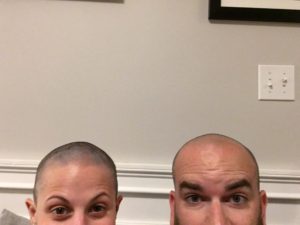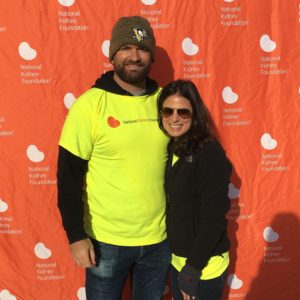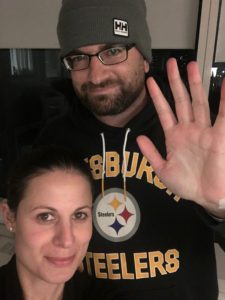On our wedding day five and a half years ago, my husband Matt and I stood in front of our family and friends and declared “in sickness and in health we would love and honor each other all the days of our lives.” Like most couples we hoped that part of our vows would be tested later on in life, but just two years later we were faced with the fight our lives with when I was diagnosed with Stage 2B cervical cancer.
My husband was immediately thrust into the role of caretaker, taking the lead in processing information from the doctors, maintaining our home, taking me to my treatments, and disseminating all pertinent information about my situation to loved ones. All while continuing to work at his very demanding job. His most important responsibility, though, evolved into being the glue that kept me together every day. He was the one I would turn to in my darkest moments to tell me everything would be okay and that I would come out the other side of this. He rarely wavered or admitted he was scared. He was my flight attendant through the turbulence, the one I looked to when things got rocky to stay calm. He was everything that I could not be.
 During my treatments and all the glorious side effects I experienced, Matt was right there. He never shied away from a needle or a trip to the bathroom when I needed assistance. He never made me feel self-conscious as the treatments ravaged my body, turning my insides out. Rather, he would consistently tell me I was beautiful. The night we shaved my head in anticipation of my hair falling out, he declared in the most genuine way, “You look so cute!” I was at my most vulnerable with Matt, and his love was unconditional. I learned to lean on him and be comfortable with the dependency.
During my treatments and all the glorious side effects I experienced, Matt was right there. He never shied away from a needle or a trip to the bathroom when I needed assistance. He never made me feel self-conscious as the treatments ravaged my body, turning my insides out. Rather, he would consistently tell me I was beautiful. The night we shaved my head in anticipation of my hair falling out, he declared in the most genuine way, “You look so cute!” I was at my most vulnerable with Matt, and his love was unconditional. I learned to lean on him and be comfortable with the dependency.

Two years after my last treatment concluded, Matt’s kidneys started showing signs of failure and his doctors recommended a kidney transplant. In a selfless act of love, Matt’s sister agreed to be the donor and we scheduled transplant for November 6. Leading up to the transplant, Matt remained calm and steadfast. He submerged himself in the logistics of it to cope with the anxiety. I, on the other hand, struggled to be the same. I was extremely anxious and instead of being the rock that Matt was for me when I was sick, I was slowly falling apart. It was as if my wounds from being sick were being ripped open again. I was angry that we had to embark on yet another scary journey, and I worried I couldn’t be as good of a caretaker as he was for me. When I shared this with Matt, he assured me he would be fine, I could handle it, and that I was strong.
I realized in that moment, it was no longer about my anxiety and me. I had to take Matt’s lead and be the caretaker he needed to get him through – calm, cool, and collected. I was no longer the patient; our roles were officially reversed. I needed to be his flight attendant and handle it all like he confidently knew I could. From then on, I focused on being a pillar of strength and I let him guide us through this experience in the way that made him feel the most comfortable. I often say that after cancer I feel like I am made of steel. Sometimes that steel melts a bit, but in this moment, it had to solidify.
Matt’s kidney transplant was a success, but recovery was incredibly intense both physically and emotionally. His post-transplant needs were even more demanding than mine were during treatment, and his spirits were put to the test. Matt needed me to help him with all aspects of his day – his medications, eating and drinking, bathing, sleeping, walking, pain management, etc. Not to mention taking his blood pressure, temperature, and tracking his urine output. However, I can say with complete confidence that because of my cancer we were prepared for all of it. I learned quickly how to anticipate Matt’s needs, to push him when he needed a nudge, to cheer him up when he was down, to listen to his fears, to cry with him, and to love him unconditionally through every single vulnerable moment. I learned from the best, and we quickly found ourselves back into a groove of being caretaker and patient. We relied once again on our friendship and strong foundation.

Being a cancer survivor has shaped who I am as a caretaker because I understand how being so highly dependent on someone can chip away at your dignity. Even if your caretaker is a loved one, a parent, a sibling, a best friend – when you can’t even go to the bathroom by yourself, you are vulnerable in ways you never thought imaginable. This is something I remind myself of when care taking for my husband and am sensitive to. I constantly put myself in his shoes, and believe I am a better caretaker for it.
Five years after promising “in sickness and in health,” Matt and I are more solid than ever. We’ve been to war together, now twice, and have come out the other side. We’ve both played the role of the patient and the role of the caretaker. Neither is easy, but being a caretaker is by far more difficult. It’s difficult to see your loved one suffer, and I have grown an even deeper appreciation for Matt’s strength during my battle. But when you’ve got a strong foundation and you learn to be what your loved one needs you to be, the rest falls into place.
To all caretakers out there, you got this. You’re stronger than you think, and your loved one appreciates you every minute of every day.